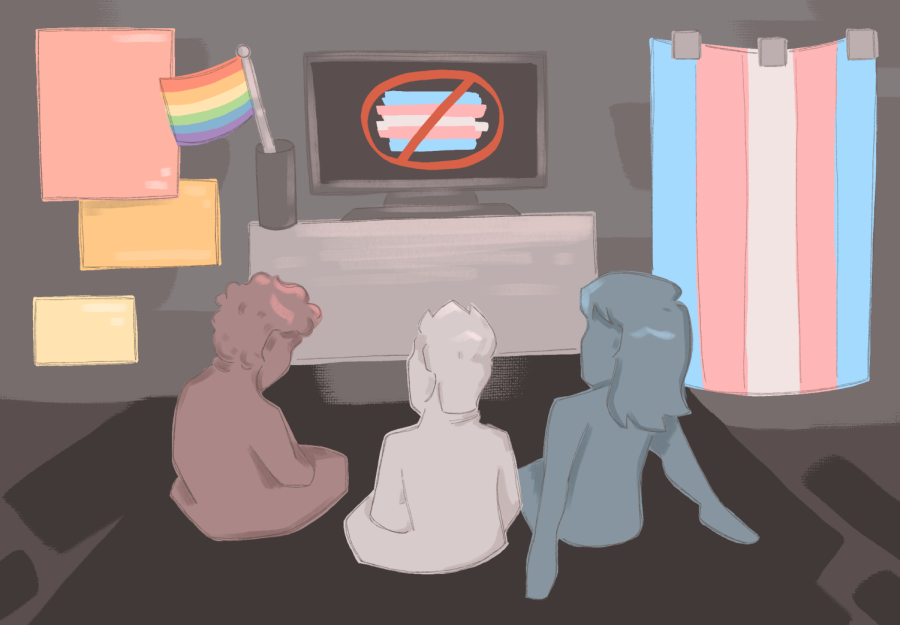UI students criticize anti-LGBTQIA+ legislation
Apr 14, 2023
As anti-LGBTQIA+ legislation is being proposed, denied or passed across the nation, University of Illinois students express their disappointment towards the legislation.
According to PBS, “434 bills that restrict fundamentals like health care, education and the freedom of expression for LGBTQ+ people,” have been introduced by state lawmakers in this year’s legislative session alone with “nearly two dozen” passed into law.
Arkansas recently banned transgender individuals from using school bathrooms that do not match the gender on their birth certificates and in Florida, a newly introduced bill is targeting gender-affirming care for minors.
Hillary Collins, sophomore in LAS, said these bills will make it harder for young kids to realize who they are and navigate their feelings.
Collins said LGBTQ+ resources and education are essential to helping people find themselves. They said these resources would have helped them when they were younger to better understand their gender identity.
Get The Daily Illini in your inbox!
“Growing up, I didn’t really realize there was anything going on with my gender until I was well into high school,” Collins said. “But even then, having half of the resources and education that I have access to now as a kid would have been absolutely life changing.”
Jay Butler, freshman in LAS, said the emergence of former president Donald Trump’s ideas and values took society backward and is the catalyst for the recent anti-LGBTQIA+ bills. They said politics used to be more together and progressive, but now politicians are divided.
“You have one party that’s like advocating for human rights and one party that’s like, ‘No, only white cisgender heterosexual men should have rights,’” Butler said.
Butler also said lawmakers are using kids as scapegoats to justify the proposed bills. They said if lawmakers cared about the children, they would try to protect LGBTQIA+ kids from discrimination.
“There’s trans children who are advocating for themselves and they’re so young,” Butler said. “They have to be exposed to all of this trauma, this discrimination at such a young age. It’s very upsetting.”
Lala Hyder, junior in LAS, shared the same viewpoint about the negative effects the legislation will bring to transgender youth.
“I just think of trans youth who have the hope of being able to live fulfilling lives and that being snatched away from them,” Hyder said. “It’s hard to think about because a lot of trans people are suffering through the consequences of the legislature and that is forcing us to live lives that are already subpar at best. It’s a success story if you are happy in the United States or anywhere else, but it’s just going to get harder with the new legislation that’s going on.”
Collins shared similar feelings and said if the proposed bills are passed, the effects will be negative.
“I don’t know if these people who are trying to pass these bills know or if they even care, but I sadly think that a lot of transgender or nonconforming kids will die or try to harm themselves because of how restrictive or difficult it will become to get this type of care,” Collins said.
Collins said gender-affirming care needs to be protected as it saves lives.
“Gender-affirming care saves lives,” Collins said. “That is an irrefutable fact that we know, and I’m really scared for those younger than us.”
Butler also agreed that gender-affirming care saves lives and said people need to be educated on gender-affirming care. Butler said some people think gender-affirming care is instant, but it is actually a lengthy process that involves not only the queer individual, but their parents and doctors.
In addition to education on gender-affirming care, people need to hear the everyday stories of LGBTQIA+ people to see that the community is just like everyone else.
“They’re like everyone else, they’re just trying to live their lives,” Butler said.
Hyder emphasized the most effective way to learn about the community was to listen to the primary source— transgender viewpoints.
“You just need to talk to trans people,” Hyder said. “I’m now in a place where I am lucky enough to be in a place where I am surrounded by people who understand and it’s a beautiful thing when it happens. It just starts by talking to one person. Suddenly it can be a totally different world. I was once someone who didn’t understand it and then I turned to someone who was (transgender).”
Collins said everyone needs to be involved in the conversation, as many bills being passed do not address single issues in the LGBTQIA+ community but are connected to other issues, such as critical race theory education.
“I think people, even those who aren’t LGBTQIA+ need to realize that … if you’re marginalized in some way, if you’re sitting back and watching them come after LGBTQIA+ people, then you need to understand and you need to know that no one else is safe,” Collins said.
“These bills are being passed very intentionally to strip away things that we may be taking for granted … and that we can’t afford to lose,” Collins said. “We can’t roll back any farther as a country or we will literally collapse on ourselves.”
Collins said people need to start taking action to prevent the nation from going backwards.
“I think what we immediately can do about this is mobilizing,” Collins said. “Calling representatives, protesting marches, all of it … whatever you can do to get the word out. Talking to people about it, voting people in your communities, in your states, your counties … I think taking action is what we can do right now.”
akend2@dailyillini.com






